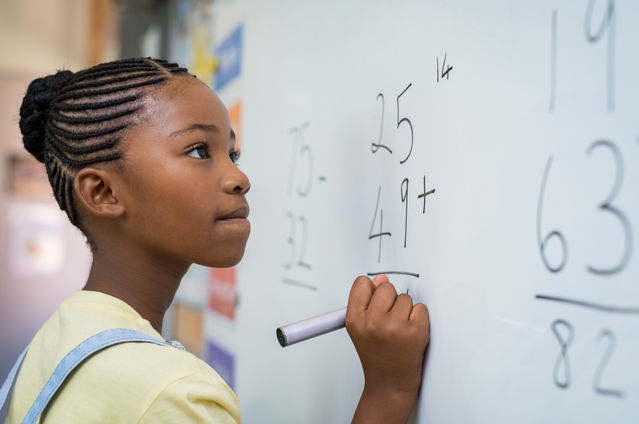Bias
Sexism and School
Addressing barriers to girls' STEM participation.
Posted April 16, 2020 Reviewed by Jessica Schrader

By Emma Allen and Adam A. Rogers
Girls and women continue to be underrepresented in STEM fields (science, technology, engineering, and mathematics), according to the National Science Foundation. They account for only 27% of doctoral degrees in mathematics, 15% in physics, 20% in computer science, and 20% in engineering. Growing research indicates that girls’ underrepresented status in these fields can result from sexism during girls’ formative years.
According to researchers, over half of teenage girls have reported experiencing some form of overt academic sexism, particularly in the form of discouraging comments about their abilities in math or science.[1,2] Sexist comments can be “benevolent” in nature (e.g., “You must be a genius because not a lot of girls study physics)” or outright disparaging (e.g., “You only got into the accounting program because you are a girl”).
Exposure to such comments, especially at a young age, can shape a girl’s educational and career paths in the long term. Such sexist treatment can be frustrating and exhausting, ultimately undermining girls’ confidence in their abilities.
Perhaps more insidious is that academic sexism can lead girls to internalize negative cultural stereotypes about their intellectual and academic abilities (e.g., “brilliance is a masculine quality”). Although such stereotypes have been repeatedly demonstrated false in research, girls who internalize these stereotypes suffer from poorer academic motivation and achievement.[2] Supportive teachers, parents, and friends can help girls overcome the negative effects of academic sexism and increase their participation in STEM fields.
Teachers, Parents, and Friends
Students need teachers that are encouraging and that will believe in their capabilities regardless of gender. Indeed, many teachers are important role models in the lives of their students. However, in coeducational settings, teachers often endorse academic gender stereotypes, perceiving boys to be more naturally gifted at math and science than girls. These beliefs explain nearly 50% of the emerging math-achievement gap between boys and girls during elementary school. [3]
These data underscore teachers’ unique position to help level the academic playing field, as they can orchestrate inclusive learning environments that promote achievement among all their students. Studies suggest teachers can be successful in this regard by creating gender-integrated classrooms (e.g., mixed-gender activities, seating arrangements, and collaborative learning groups) and implementing evidence-based curriculums that reduce stereotypes and promote equal status expectations for their students.[4]
Parents can also help support girls’ STEM-related passions and interests. When girls feel pressure to conform to traditional feminine stereotypes, they are less motivated to pursue math-related interests.[5] However, when girls feel their interests are actively supported and validated by their parents, they are more likely to feel more freedom to choose academic fields that resonate with them, rather than stereotyped expectations.[6]
Finally, girls with a positive peer support system tend to have stronger self-concepts of their abilities in STEM subjects.[6] In particular, having friends who are like-minded in academic interests and who are academically motivated prove to be helpful in this regard. Of course, locating such support among the peer group can be tricky because peers are also the most common source of sexist comments, particularly male peers.[1] This further underscores the need for educators and other adults to be cognizant of sexist teasing within peer groups and to educate youth about the dangers of such.
Conclusion
It is important to foster environments that allow youth to pursue academic interests that resonate with them. For many girls, this means addressing gender stereotypic barriers related to STEM. Youth internalize messages they receive from society, and so many girls can be affected by how others view their abilities in these subjects. Indeed, many female students have experienced a lowered sense of competence in math and science due to these societal views. Supportive teachers, parents, and friends can be key in challenging such barriers and can allow more girls to successfully participate in and contribute to STEM in the coming decades.
References
[1] Leaper, C., & Brown, C. S. (2008). Perceived experiences with sexism among adolescent girls. Child Development, 79(3), 685-704.
[2] Brown, C. S., & Leaper, C. (2010). Latina and european american girls’ experiences with academic sexism and their self-concepts in mathematics and science during adolescence. Sex Roles, 63(11), 860–870.
[3] Robinson-Cimpian, J. P., Lubienski, S. T., Ganley, C. M., & Copur-Gencturk, Y. (2014). Teachers’ perceptions of students’ mathematics proficiency may exacerbate early gender gaps in achievement. Developmental Psychology, 50(4), 1262.
[4] Fabes, R. A., Martin, C. L., Hanish, L. D., & DeLay, D. (2018). Gender integration in coeducational classrooms: Advancing educational research and practice. School Psychology Quarterly, 33(2), 182.
[5] Bian, L., Leslie, S. J., & Cimpian, A. (2017). Gender stereotypes about intellectual ability emerge early and influence children’s interests. Science, 355(6323), 389-391.
[6] Leaper, C., Farkas, T., & Brown, C. S. (2012). Adolescent girls’ experiences and gender-related beliefs in relation to their motivation in math/science and English. Journal of Youth and Adolescence, 41(3), 268-282.


